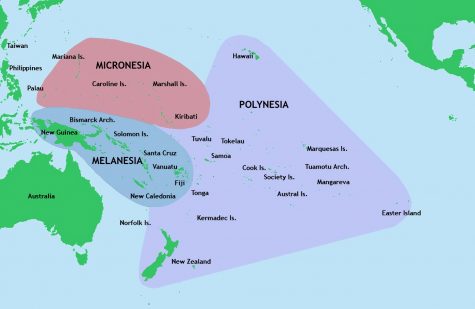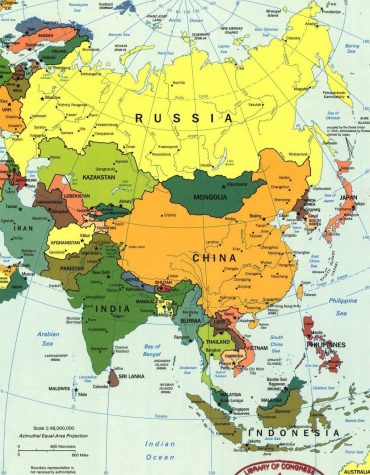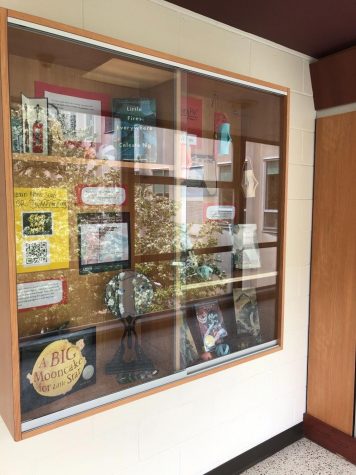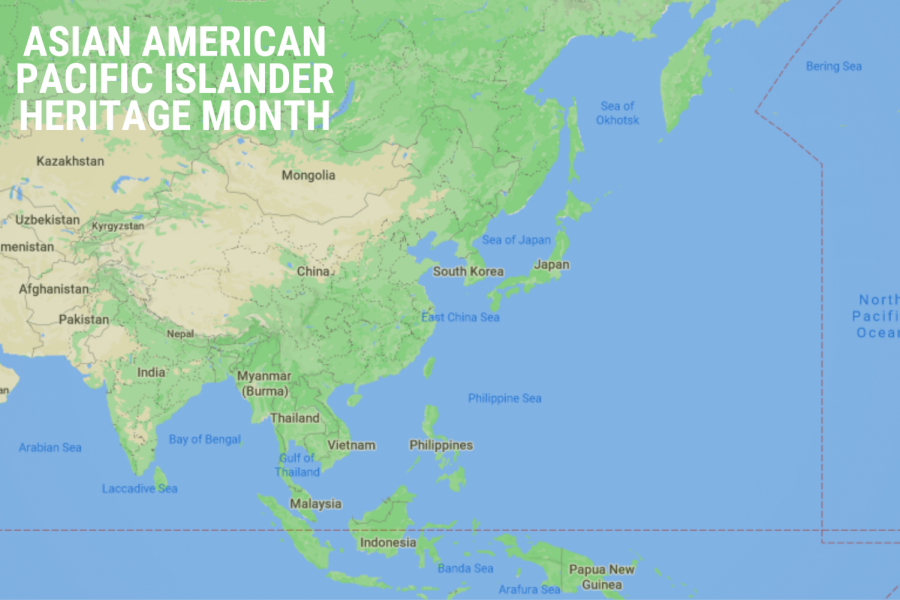Asian American Pacific Islander Heritage Month begins
The Asian Culture Club at Pascack Hills is using posters, display cases, and social media to educate the community about AAPI countries and figures.
Google Maps
Asian American Pacific Islander Heritage Month is honored each year during the month of May.
Asian American Pacific Islander Heritage Month is honored each year during May.
The terms “Asian American” and “Pacific Islander” encompass two large groups of people from diverse backgrounds. Asian Americans are people that live on the Asian continent. Pacific islanders are groups from the Melanesia, Micronesia, and Polynesia islands. Three countries in these areas are Fiji, Guam, and the Hawaiian Islands.

A map of the Pacific islands.

A map of the continent of Asia.
Originally, AAPI heritage was honored for only one week. In 1978, Capital Hill employee Jeanie Jew suggested to Congressman Frank Horton to dedicate a time to honoring AAPI heritage.
With the help of Horton’s chief of staff Ruby Moy, they were able to push a bill that would honor AAPI heritage during the first week of May.
Two major events occurred in this designated week: the arrival of the first Japanese immigrant in 1843 and the completion of the transcontinental railroad in 1869, which Chinese immigrants had a large role in building.
While the law passed, the original bill was not annually renewed. As a result, organizations and supporters of the bill had to push for the re-signing of the law every year.
Congress finally established the month of May as AAPI Heritage Month in 1992, more than ten years after the bill was first proposed.
“As a first-generation Asian American, it was very hard identifying with my own culture and the culture of my peers,” Hills sophomore Stephanie Ye expressed. “As someone who has been disconnected from their culture for most of their childhood, having a month to appreciate and learn about my heritage is something I cherish.”
The Pascack Hills Asian Culture Club is currently implementing its celebration of AAPI Heritage Month. The club is in the process of putting posters around the lobby and school that explain the history of the month, flags of AAPI countries, and prominent AAPI figures in the United States. A display case located near the library has already been created.
They will also utilize their Instagram (@phhsacc) to bring more awareness to the month. Throughout May, the ACC is going to post more detailed information about AAPI countries and films related to the AAPI community.

A display case near the library designed by the Asian Culture Club.
Hills freshman Julia Bang commented that, while AAPI Heritage Month is about celebrating the contributions and influence of their community, it is also important to recognize the struggles they experience.
“After the Asian hate crimes we all witnessed and heard of these past few months, I think this time serves as a fitting opportunity of reflection,” she said.
The pandemic has caused an international spike in anti-Asian sentiment. However, both Asian Americans and Pacific Islanders experienced different, individual oppression in United States’ history.
One personal reason why Jew wanted a time to honor AAPI heritage was that her grandfather died due to violence against Chinese immigrants.
Legislation such as the Chinese Exclusion Act of 1882 and the Gentlemen’s Agreement, which was made with Japan, restricted Asian immigration. Many of these acts were stemmed from fear about Asian laborers overtaking the job market in the U.S.
Large-scale violence motivated by xenophobia directed at Asian Americans is also prevalent in U.S. history. The Massacre of 1871 was one of the largest mass lynchings in the U.S. It led to the death of around 17 Chinese people.
Pacific Islanders face other types of oppression. Their land has been colonized multiple times by other countries and the threat of their lands being taken is still present today.
Nuclear experimentation in some areas of the Pacific Islands during World War II also forced many people to flee their homes. Some were exposed to deadly radiation from these experiments, which causes cancer and other serious health problems.
Bang hoped “those who hold prejudices or stereotypes against the AAPI community can educate themselves during this month.”
Ye also agreed that having more education about the month and AAPI community “could prevent discrimination against Asians in America if children are taught that our culture is accepted.”
AAPI Heritage Month honors the culture, achievements, and influence the AAPI community has had throughout American history while also acknowledging the struggles they have endured.
There are several ways to celebrate this month. Reading AAPI books and watching AAPI films are one way. Another one is learning more about the history of the AAPI community to understand more about them.
Bang stated, “Although I always am, this month especially I’m proud of my culture and background as a Korean.”

Sabrina Moe is a Hills senior. She joined the Trailblazer her sophomore year as a staff writer and edited for the In-Depth section her junior year. This year, Moe is eager to edit for the College Corner section and to manage college news among the Hills community.
Fun fact: Moe enjoys listening to various genres of music, especially music from the early 2010s.

















































